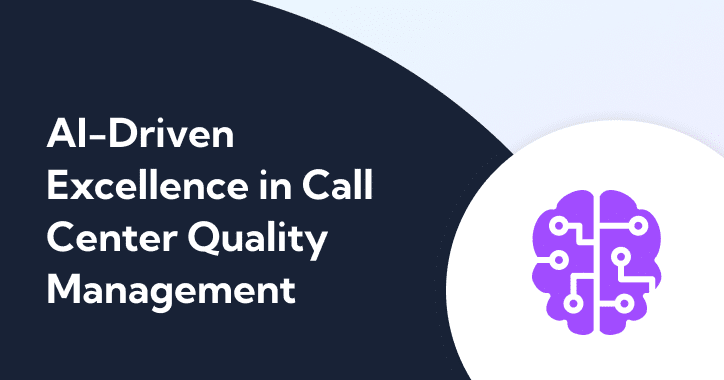Call center compliance involves meeting certain regional and international requirements and guidelines related to security and collecting and storing sensitive customer data.
Many legislative bodies across the world have imposed restrictions on how call centers interact with their customers and handle their data for the purpose of controlling fraud and maintaining data privacy and security.
This guide aims to introduce you to call center compliance, its importance for your organization, and how you can integrate compliance into your company’s culture and policies.
Call Center Compliance: A Quick Definition
Call center compliance involves adhering to call-center-specific laws and regulations set by local, federal, and global regulatory and legislative bodies.
Relevant compliance standards help call centers maintain a positive reputation, earn customers’ trust, ensure business continuity, and avoid fines and penalties.

History of Call Center Compliance
Call centers date back to the 1960s. Since its existence, there haven’t been any rules or regulations that govern contact center common practices.
This changed with the launch of the 1991 Telephone Consumer Protection Act (TCPA) in the United States. The act set rules and regulations that tackled concerns related to unsolicited telemarketing practices.
Some industry-specific data protection regulations, such as HIPAA (Health Insurance Portability and Accountability Act), also emerged to maintain privacy and security for protected health information.
More regulations started emerging in the 90s and early 2000s, with Do-Not-Call lists becoming common in many countries.
In the 2010s, with rising data privacy and security concerns, several acts and regulations were established in the United States and the European Union to address these concerns. These include PCI-DSS (Payment Card Industry Data Security Standard), the FDCPA (Fair Debt Collection Practices Act) in the US, and the GDPR (General Data Protection Regulation) in the European Union.
The technological advancements that involved the use of automated tools, call recording software, omni-channel platforms, and AI-enabled analytics and reporting systems, have accelerated the development of these acts.
Why is Call Center Compliance Important?
Call center compliance is vital for increasing sales, improving customer service, and collecting debts in a fair and secure way.
Call Center Compliance in Sales
Complying with recognized regulations and acts creates a positive brand image for your organization and increases customer trust and loyalty, which naturally boosts sales.
Failing to comply, on the flip side, makes customers more reluctant when dealing with your company, knowing that their personal data is at risk. This results in lost business and revenue.
Call Center Compliance in Customer Service
Adhering to compliance acts typically involves recording and analyzing customer interactions at scale for quality assurance.
By ensuring that agents respect the call center’s commitment to meeting compliance standards in their interactions with your customers, you can provide customers with optimal experiences that meet their service quality expectations.
Additionally, failing to comply with regulations may contribute to a higher turnover rate, as many agents may decide to work for other more reputable organizations that take regulatory compliance and customer data protection more seriously.
Call Center Compliance in Collections and Accounts Receivable
Complying with regulations such as the Fair Debt Collection Practices Act (FDCPA) in the contact center debt collection process is crucial to avoid penalties, legal claims, and reputational hits.
Common Call Center Compliance Mistakes
Some of the most widespread call center compliance issues include:
Recording Conversations without Agent or Customer Consent
In accordance with the TCPA, your call center must ask for agent and customer consent before recording any inbound or outbound conversations. Consent here isn’t limited to simply informing the customer before the call; you must get a clear yes or no response from the customer to be able to record their conversations.
Recording and Storing Payment Information in the Wrong Way
Improper collection of payment information from your customers violates the PCI’s regulations for protecting customer payment data. The data includes critical payment information like pin codes and CSV numbers.
It’s good practice to train agents on proper payment data recording to prevent fines, reputational damage, and lost customer trust.
Contacting Numbers in the DNC List
The Do Not Call (or DNC) registry enables customers to opt out of receiving telemarketing calls that include sales pitches. Calling any of these numbers for sales purposes could result in hefty penalties for your organization.
You can prevent this from happening by continuously keeping your agents up to date with the latest DNC registry when they’re making sales calls.
How to Establish a Contact Center Compliance Checklist
Creating a call center regulatory compliance checklist enables your organization to monitor compliance adherence, implement the right technologies, train agents on compliance best practices, and have a standardized methodology for ensuring compliance with different acts and regulations.
Typically, your call center compliance checklist should include the following:
1. Maintain Network Security
Contact centers struggle to keep their network secure, especially with most organizations shifting to a hybrid or fully remote work environment. Securing endpoints becomes a challenge, and without adequate employee training, the new way of work can expose your call center to data breaches and other security risks.
By utilizing network access control, you can authenticate agents to limit who can access company data and use your contact center’s hardware and software assets.
2. Authenticate Customers
Authenticating customers is vital for protecting customer data and preventing identity theft. It’s important that you implement strict customer authentication criteria to make sure that the individuals interacting with your contact center are who they claim they are.
Ideally, your contact center should implement multi-factor authentication to confirm customer identity.
Protecting credit card data such as names, card numbers, and phone numbers is also critical to safeguarding your customers against fraudulent activities and identity thefts.
By prompting customers to submit multiple pieces of information, such as passwords, SMS codes, and basic account information, you’ll be able to authenticate them more rigorously and protect their data.
3. Conduct Physical Audits
Carrying out audits on agent workstations is crucial for call centers that have adopted the hybrid or remote work model. By ensuring that the agent’s workstation meets basic compliance requirements, you can avoid future problems that could lead to a compliance violation.
4. Manage and Protect Sensitive Data
Complying with standards typically involves placing a high emphasis on protecting customer data wherever it resides. This is especially important for critical data like credit card numbers and other sensitive information.
To protect customer data, you can implement advanced encryption protocols and use automated tools such as IVR (Interactive Voice Response) systems to minimize human error and process sensitive transactions safely.
5. Record Customer Conversations
Call recording helps your call center ensure compliance by checking if agents are adhering to your compliance guidelines, such as authentication and disclosures. Using speech analytics solutions, you’ll be able to automatically record, transcribe, and score calls.
Reviewing customer conversations also helps call center managers create personalized training programs for each agent by evaluating the accuracy of the information they provided and whether they followed your call center’s internal SOPs (Standard Operating Procedures).
6. Follow Relevant Compliance Regulations and Acts
Ensuring adherence to different regulations and acts related to your contact center’s interactions with customers and data collection and storage practices is vital for maintaining compliance.
Among the relevant standards and acts that you need to follow are:
- The Telephone Consumer Protection Act (TCPA): The TCPA places limitations on making sales calls and using automated call equipment. To avoid fines and penalties, it’s vital that you educate your agents about the TCPA guidelines and the consequences of not following them.
- The Health Insurance Portability and Accountability Act (HIPAA): HIPAA regulates how contact centers collect, store, and protect their customers’ Personally Identifiable Health Information (PIHI).
- The General Data Protection Regulation (GDPR): The GDPR sets guidelines for businesses that collect and store EU customer data, regardless of the company’s actual presence in the EU market. The fundamental guideline grants customers the right to request their personal data and ask for it to be deleted. For businesses, it’s important to make such a process easy by properly storing data and enabling its deletion when the customer requests so.
- The Dodd-Frank Act: The Dodd-Frank Act requires call centers to record customer interactions and store them in a searchable manner, with the date and time of each conversation being recorded as well.
- Gramm-Leach-Bliley Act: The Gramm-Leaxh-Bliley Act makes it mandatory for call centers to share how they inform borrowers on how can they opt out if they want to. It also requires call centers to document their security practices.
- Fair Debt Collection Practice: The Fair Debt Collection Practice Act (FDCPA) prevents unfair or exploitative debt collection practices with a set of rules and guidelines for contact centers that collect information about customers’ debts.
- Sarbanes-Oxley Act: This act mandates contact centers to maintain recorded calls in their original state without deletion or changes until the preset timeframe concludes.
- Payment Card Industry Data Security Standard (PCI-DSS): The PCI DSS sets guidelines on how businesses that process digital transactions should store and protect sensitive cardholders’ information.
- Equal Credit Opportunity Act: This act prevents call centers from qualifying loan candidates based on discriminational factors like race and gender.
- Truth in Lending Act: The Truth in Lending Act ensures that lending entities’ call centers provide full transparency regarding hidden fees, late fees, and terms before setting up a contract with the customer.
7. Create an Information Security Policy
An information security policy is a document that describes the measures your call center takes to protect internal and external data.
Establishing an information security policy provides your agents with a standardized framework that they can refer to whenever data protection is concerned.
To put an information security policy in place, you must discuss its content with your legal and IT departments, as well as inform all of your agents of the updates.
8. Design Robust Training Programs for Your Agents
Training your agents and keeping them up to date with international, federal, and state-specific compliance requirements and best practices will help your contact center meet compliance regulations.

Using AI to Support Call Center Compliance
Implementing AI solutions in your contact center can help you adhere to compliance requirements by providing real-time assistance for your agents during calls.
Speech analytics software makes it easier for you to maintain compliance in your call center by monitoring 100% of calls, converting the speech to searchable text, and evaluating calls automatically.
It allows you to monitor whether your agents follow scripts accurately and identifies both the presence of necessary phrases and common mistakes.
When an agent deviates from the script, the system alerts you and influences their performance rating. Many speech analytics solutions also feature redaction capabilities that eliminate sensitive customer information such as credit card numbers, ensuring seamless compliance with different regulations related to customer data security, ownership, and privacy.
Moreover, you can also use AI chatbots to answer common customer concerns and queries around the clock, which helps minimize human error and free up your agents for more complex customer queries that require their attention.
By eliminating repetitive tasks, you’ll be able to improve agent productivity and prevent burn-out, ensuring that your agents perform their best and adhere to compliance guidelines in their conversations with your customers.
Meet Compliance Requirements With Balto
Balto offers AI-enabled, real-time conversation monitoring to ensure that agents are following your call center compliance guidelines. By providing agents with immediate assistance and feedback during live calls, you’ll be able to maintain compliance in complex situations and prevent violations.
With Balto’s data collection and analysis capabilities, you’ll also be able to create personalized training programs for each agent and conduct compliance audits.
To explore how Balto works in more detail, check out our definitive user guide here. We’re also happy to offer you a free demo of Balto so you can explore how it can help you meet compliance requirements in action.






